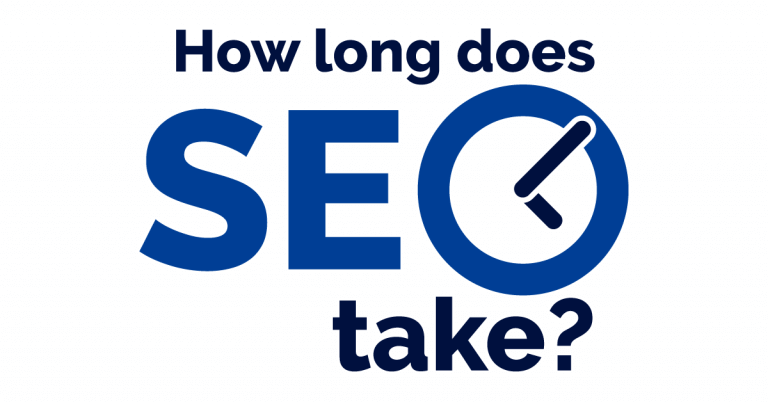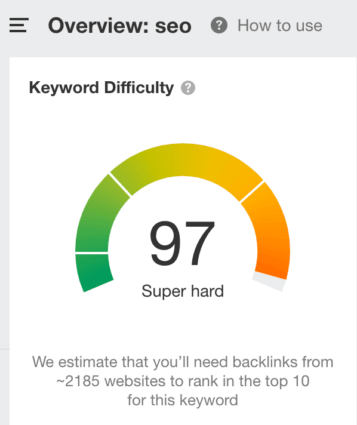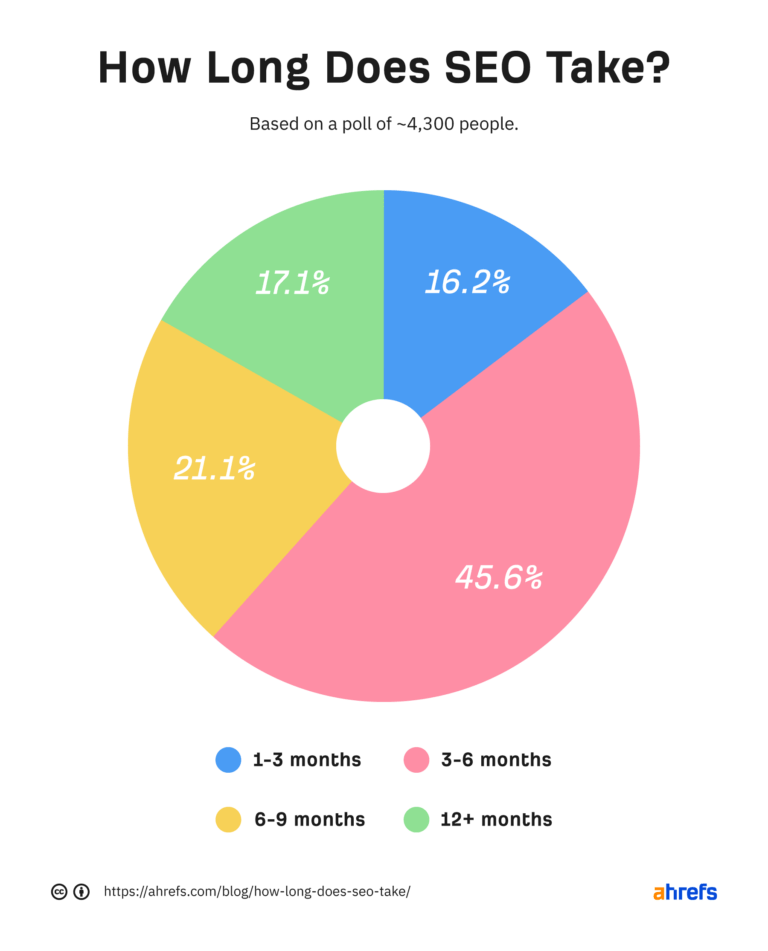
Developing an SEO strategy takes time and planning. That much is understood. Once that strategy is executed, however, business owners inevitably wonder how long it will take for the SEO results to take effect. According to Forbes, “If you can’t budget for 6 to 12 months of SEO, you might be better off putting that budget somewhere else.”
Most SEO experts will agree with Forbes’ 6–12-month statement regarding the time it takes for SEO to begin improving a website’s rankings. Even then, that is merely the beginning. SEO is a long-term marketing tactic by design, and a good SEO strategy will grow over time. Companies often find this timeline frustrating, especially when planning a marketing strategy that matches dollars to days and ROI.
While companies would prefer a definitive answer, there’s no real way to provide it due to all the variables involved in SEO. Some of those variables include the website’s domain authority score, how competitive the keywords are you’re trying to rank for, and how much competition is out there. So, not only do you have to optimize your own website, but you also have to evaluate some of these same variables in your competitors’ SEO to see how you compare.
It’s a Process
Despite the challenges mentioned above, SEO is a marketing tactic with one of the most successful ROIs, making it worth the effort and patience to reap the results. This article discusses the principles and variables to consider when developing and executing your SEO strategy, which is all part of the 6–12-month period of return. By evaluating the data behind these variables, you can gauge how long it will take to see your targeted results.
Remember, SEO is more than just advertising. Search Engine Results Pages (SERPs) rankings aren’t accomplished via ad campaigns. You have to rank #1 for your chosen keyword(s) by demonstrating to Google that yours is the best result. Doing this requires addressing several aspects of SEO, each of which can affect the SEO timeline.
Factors that Affect Your SEO Timeline
As mentioned, several factors affect not only your SEO strategy but how long it will take to see results. Those factors include but are not limited to content, your website’s history and authority score, quality of backlinks, your competition, and more.
Website History
Is your website domain brand new or well-established? A younger domain takes longer to show results because it hasn’t yet built authority or earned many backlinks. Of course, a brand-new domain will have neither of these. As a result, SEO results could take even longer than the projected 12 months.
On the other hand, an established domain has likely earned some authority and has backlinks on other websites pointing to it. While this doesn’t automatically shorten your timeline for results, it does give you more of a solid foundation from which to start.
When creating or revising an SEO strategy, reviewing your website’s history and traffic is essential to see where it stands. Take a look at past and current performance by looking at site impressions (view these on the Google Search Console). Also, investigate whether Google has penalized your site in the past or whether a core algorithm update has impacted your traffic, etc. You’ll need to rectify those types of issues.
You’ll also want to review your website’s estimated traffic over time and check for any drops in organic visibility. Also, review past performance. How has your site performed over the past two to three years? The results of all these analyses and any resolutions you apply also affects the results timeline.
Website Authority Score
Website history and authority are linked in that it takes some time to build authority. Basically, the authority score is the overall quality indicator of a domain in terms of webpage impact, links, etc. The higher the score, the more weight the domain or webpage carries, which also increases the potential for more backlinks.
Speaking of backlinks, you can analyze the authority score on backlinks alone. For instance, you can review the number of backlinks, the referring domains, monthly visits that occur from those backlinks, and the keywords associated with them. The score helps you understand the benefits a particular backlink from a referring domain brings to your website’s SEO.
Once again, a more established website will have a more substantial presence and has likely been optimized in the past. Thus, there are likely well-performing SEO strategies already in play, as well as existing backlinks on other sites. A newer site, logically, has a lower authority score because there hasn’t been time to generate those backlinks.
Another impact on website authority is competitor SEO performance. Meaning, when your competitors up their game and increase their authority scores, yours may go down even if you’ve made no changes to your site. Your competitors have tipped the balance on the strength and overall popularity of websites within your niche. In this way, the authority score compares domains more than it determines quality.
Backlinks
While we’ve mentioned backlinks more than once in this article, they deserve deeper discussion. Backlinks are one of Google’s top-ranking factors. They indicate trust in and popularity of a website. They also have the ability to bolster a website’s rankings. High-quality links can drive rankings faster than lower-quality links.
Backlinks are votes or endorsements between two websites. Your site has earned any backlinks you already have out there. Likewise, any links in your own site out to another were selected out of trust. Thus, there are no shortcuts to earning quality backlinks. It takes time to make your mark and earn backlinks. Quality content is the way to go, and that doesn’t come overnight.
The Competition
Due in part to the authority score, your SEO results may come quickly if you’re in a low competition niche with respective low competition search queries. Your keywords won’t have much competition, so optimizing for them should see much quicker results.
However, if your keywords are more competitive, expect a longer wait to see more prominent page visibility and increased traffic. Your strategies are most likely on target; they will simply take longer to pull the desired effect.
In addition to keywords, take a look at what your competitors are doing, most importantly, what they are doing right. Whatever your SEO strategy, your competition’s success should be considered, including any aggressive strategies they have in play.

Your SEO Resources
The number of resources your company has allocated toward SEO is a significant factor in how long it takes for SEO to work. The more resources a company allocates toward SEO, the faster it will see results. Smaller companies are often conservative with their SEO due to limited resources. Should the SEO fall short of expectations, management may feel as though SEO was a wasted investment. In reality, SEO takes time to do right. The upfront investment may not seem worthwhile compared to the ROI unless you give it enough time to work for you.
When allocating resources, keep in mind that there are three fundamental drivers of SEO success. One is backlinks, which we discussed earlier. The other two are technical SEO and content. Whether you have in-house personnel who can handle these or hire freelance services, remember how critical technical SEO and quality content are to your overall SEO endeavors. The more resources you can assign to these, the sooner you will see results.
Technical SEO
If your website has any technical SEO issues, your team will need to resolve them before any of your efforts can be realized. Remediating some issues will pose a more significant challenge than others, though any problem within your site must be fixed.
Technical SEO covers anything relating to the following:
- Canonicalization
- Crawling and indexing
- Hreflang
- Site speed
- Structured data
- Duplicate content
- XML sitemaps
Using your chosen site audit tool will help you identify issues like these. Once you resolve any problems, any other strategy you decide to put in place will now have the freedom to deploy as intended, with no impediment. Your website can formidably compete against others and rank higher in SERPs pages.
Content
As you’ve heard so many times, quality content is crucial to SEO success and remains one of Google’s top ranking factors. Running analytics, building backlinks, and adjusting your technical SEO will do little good if your site contains poor content.
However you devise your strategy or allocate resources, you must place priority on content creation so that your content accomplishes the following:
- It is compelling, draws a searcher’s interest, and earns backlinks
- Matches the searcher’s intent
- Targets ranking keywords and presents something better than the competition
Average or poor-quality content doesn’t impress Google or engage visitors, which can delay your SEO results.
Recommended Actions for Speeding Up Your SEO
As we have stated, the more resources you can dedicate to your SEO endeavors, the sooner you’ll see the results of your efforts. If your in-house staff is overtasked, consider hiring short-term freelance writers to create new content. Or, invest in training that teaches your team how to use the SEO tools you already have. These tools all have useful features that often go unused. Sometimes, more resources don’t mean hiring new people at all. It may mean creating small, cross-functional teams to handle specific SEO tasks.
Next are some other recommendations for expediting your SEO results.
Develop a Strong SEO Strategy
While it takes time initially, a solid strategy keeps you on track and gives you a better chance of achieving faster results.
For example, say you’re trying to rank for some highly competitive keywords. If you’re investing your resources in those, you’ll be waiting a while to see results. Alternatively, you can focus on some lower-competition keywords that nonetheless have ranking value. This way, your site can begin generating organic traffic sooner rather than later while also accumulating links and gaining website authority. You can target the high-competition keywords for the next round.
Build Consistency into Your Execution
Once your strategy is devised, you have to execute it. That seems simple enough; however, if you’re held up by budget delays or resistant stakeholders, you’ll encounter delays. The longer it takes to deploy your SEO, the longer it takes to see results.
However you need to do it, ensure that you consistently execute your planned strategies so they deploy on time. Remember, the 6-12 months includes the execution period. So, if your SEO rolls out late, that timeline is set back.
Monitor Your Website Performance
After you’ve implemented your SEO strategy, you should continuously monitor your site to ensure it sees results. SEO is not a one-time application. Any good plan incorporates reporting and maintenance as ongoing tasks.
Often, such reporting provides the opportunity to tweak the strategy to correct technical SEO errors or modify the strategy or strategies as needed. SEO is, after all, ongoing work. It is a long-term solution that justifies itself as well as your company’s investment as it grows your website’s visibility and rankings.
When to Expect Results
As stated, SEO should show measurable results within 6 to 12 months. At that point, you should see an increase in traffic and related leads and conversions. You may not have achieved your goal at this early point, though this will mark favorable progress. What is more certain is that you won’t see SEO results in less than six months, especially if you apply a limited budget of less than $3k per month.
It’s not practical to give a figure that applies to all websites, given the countless variables. The best any SEO professional can do is provide a best guess based on the website’s current performance and the proposed SEO strategy.
The bottom line is it takes time to improve SEO. Google and other search engines show the best results for any given query. It takes time for your website to earn its rank. Your SEO strategies need time to work as intended. The result will be improved search visibility. With the right strategy in place, you should be able to accomplish this within the 12-month period.

Conclusion
SEO results grow over time. So, whatever results you see at the six-month mark should and will be less than what you’ll see at 12 months. Somewhere along the way, your results may taper off, though they will resume as your SEO continues its work.
In summary, the more resources you can allocate from the beginning, the faster you’ll see results, though no results are immediate. They take a few months to appear and up to a year to yield measurable results. Remember, every website is unique. So, there’s no such thing as a cookie-cutter solution. If you need help developing a strategy that addresses your website’s technical issues, content quality, and link profile strength, see what SEO strategy services we have to offer.